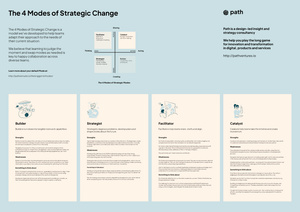Over-building your way to great, simple experiences
Over-building is a creative approach to product or service development that can make it easier to balance the long view with a bias to action.

Working on a new client service recently prompted some reflections and in this post, I'm going to talk through a deeply in-grained design instinct that I think offers a path through the tension between a long view and bias to action.
One of the most difficult things at the start of developing a new product or service is finding a kernel of "product sense" at the heart of it. Teams can get to this from instinct, insight or experience, but I usually find it comes from hard work, distilling something clear from a swirl of ideas, desires and curiosities. We build the experience up, and tear it down, trying different angles, until something clicks.
One of the most productive ways to get to there is what I'm calling over-building. I'm taking this from the Disney technique of over-management, which involves empowering front-line staff to exceed expectations in order to create great experiences for guests at their parks. The idea is that by setting an expectation of doing too much, the overall baseline is set high.
What I mean by over-building is not getting caught too early in synthesis and prioritisation. Allowing an evolving service to be messy and unclear, to have too many ideas and competing features. Deliberately emphasising quantity over quality at the foundational stages of a project helps you exorcise demons early, whilst the cost of doing so is low. You build understanding in your team of what works and what doesn't. And the emerging synthesis is often true synthesis, rather than picking a winner too early and leaving value on the table.
When I was at Livework back in the day, we used to build unique services for an individual research participant. In short order, this would result in 10-20 completely bespoke services that stood no chance of being scalable. However the process helped us identify patterns and moments that "clicked". The end results were often simpler and clearer, distilled around the gravity of an organising insight cutting across the diversity.
Over-building can be done by actually building out technology, or through design and prototyping. The key is not getting too hung up on finding the "right" answer, and instead to indulge all our instincts for play and exploration. More is good. This moment won't last, and we'll soon have to select and focus, so we want to maximise our opportunities to discover a great interaction, or find a kernel of truth we don't want to let go of.
Today this approach is foundational to how we work, starting out by building a landscapes of ideas that aren't necessarily part of a roadmap, but rather an ecosystem of possibilities that enable more conscious decisions about where to focus.
I believe this is a critical part of front-loading for success in a new project. It gives everyone space to air their ideas, develop creative mash-ups, consciously identify the dead-ends and ultimately agree on priorities. The outcome will be more confidence that you're aligned on the simplest and most engaging product or service mechanic.

